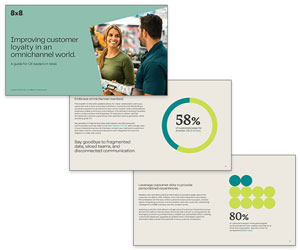With the right strategies contact centres can develop a clear understanding of customer emotions, enabling targeted improvements that enhance the overall customer experience.
To find out how, we asked Jessica Smith, Director / Head of CCaaS Product Marketing at 8×8, to outline three key approaches contact centres can use to gauge customer sentiment effectively.
Video: 3 Ways to Measure Customer Emotion in the Contact Centre
Watch the video below to hear Jessica explain three ways contact centres can measure customer emotion:
With thanks to Jessica Smith, Director / Head of CCaaS Product Marketing at 8×8, for contributing to this video.
3 Ways to Measure Customer Emotion
Measuring customer emotion in the contact centre is going to involve employing a combination of quantitative and qualitative methods to really gauge customer sentiment. You can break this down into three key categories.
That’s collecting customer feedback, AI-powered insights, and powerful reporting.
While these are really intertwined, they can also stand on their own for the purposes of talking about how to measure customer sentiment. Let’s talk about each of them individually:
1. Collecting Customer Feedback
Gathering feedback directly from customers provides valuable insights into their emotions and experiences.
You also want to make sure that you’re conducting customer surveys. A combination of voice, as well as through digital channels.
“So as far as collecting customer feedback, and doing some of that analysis, as well as surveys, you want to thoroughly review and analyse customer feedback in terms of comments and reviews.
And you want to do this across a variety of channels, to really understand emotional tone and maybe even identify areas for improvement.
You also want to make sure that you’re conducting customer surveys. A combination of voice, as well as through digital channels.
Additionally you’ll be able to analyse sentiment within the questionnaire to directly understand their feelings about their experiences, and further get into some of those insights.”
So to summarise contact centres can use:
Surveys
Conducted across voice and digital channels, surveys help measure customer sentiment through specific questions.
Comments and Reviews
Analysing written feedback on various platforms reveals emotional tones and areas for improvement.
Reviewing this data thoroughly ensures that organisations understand customer emotions and identify ways to enhance service.
2. AI-Powered Insights
Artificial intelligence enables deeper analysis of customer interactions. Key tools include:
Speech and Text Analytics
These tools detect emotional cues such as tone, pitch, and intensity in voice calls. For written communication, natural language processing helps identify and categorise emotions in emails, chats, and social media interactions.
“When it comes to AI-powered insights, specifically what I’m talking about here is interaction analytics, or possibly known as speech and text analytics.
Being able to implement speech and text analytics to analyse a variety of your interactions, detect emotional cues such as tone and pitch, even intensity to really deeply assess customer sentiment is a really really powerful tool in the contact centre.
Additionally, as you’re analysing some things like written communication, maybe it’s emails, maybe it’s chat transcripts, or social media interactions, you can use that natural language processing to really identify and maybe even categorize some of these emotions.
So as you’re looking at the collective pool of data it can be much more powerful to understand across the board.“
Predictive Analytics
Historical data is used to anticipate potential issues and gauge emotional trends, allowing for proactive responses.
These AI-powered methods offer a comprehensive view of customer sentiment across all channels.
“Additionally when it comes to AI-powered insights you want to be looking at predictive analytics, so potentially modelling this out with some predictive models to really anticipate potential issues, or emotions, based on historical data.”
3. Powerful Reporting
Accurate reporting turns data into actionable insights. Three key components of effective reporting are:
True Customer Journey Analytics
Understanding touchpoints in the customer journey helps pinpoint areas that evoke positive or negative emotions.
“Having true customer journey analysis, understanding the touchpoints within their journey, and what potentially may be evoking either positive or negative experiences.
For example, if you have an understanding of where there may be friction in terms of their self-service journey, that’s a really great way to pinpoint customer sentiment.”
Real-Time Dashboards
These dashboards provide instant insights into customer interactions, enabling immediate responses to emotional cues detected in tone or phrasing.
“Additionally, real-time dashboards, having some type of presentation of real-time analytics that provides instant insights into those interactions, which allows you to have more of an immediate response to address some of those emerging emotional issues.
Again being able to detect tone, or certain phrasing, that may be worth alerting you in real time.”
Social Media Monitoring
Analysing customer mentions of your brand on social platforms provides public sentiment insights.
Sentiment analysis tools can help track trends and gauge how your customers collectively perceive your service.
“And then the last bit is social media monitoring. So social media has really become a phenomenal place for us to go to in terms of how customers are actually mentioning a brand, a product, or a service, and using that or different sentiment analysis tools.
I should say to really gauge public sentiment and how your customers are speaking about you collectively, those are really the three key things that you can use to really measure customer sentiment in the contact centre.”
Benchmarking for Broader Insights
Contact centres should benchmark their emotion metrics against industry standards and competitors. This broader perspective highlights areas for improvement and ensures service remains competitive.
“The last thing that I would leave you with is, you want to be sure to incorporate benchmarking. Just benchmarking in terms of where do you sit against industry standards.
Benchmark your customer emotion metrics against those industry standards, or even competitors, to really gain a broader perspective on customer sentiment.
So if you combine some of these methods, I really think that as a contact centre, as customer experience, you can really create a comprehensive understanding of customer emotion, allowing for really targeted improvements across the board.”
If you are looking for more great insights from the experts, check out these next:
- Top Tips to Optimize Occupancy and Utilization
- Steps to Creating ‘Super-Fan’ Customers
- Examples of Customer Service Empathy Statements
- Tips to Reduce Call Queue Time
Author: Robyn Coppell
Reviewed by: Hannah Swankie
Published On: 16th Jan 2024 - Last modified: 25th Sep 2025
Read more about - Video, 8x8, Customer Experience (CX), Emotion, Jessica Smith, Top Story, Videos

















